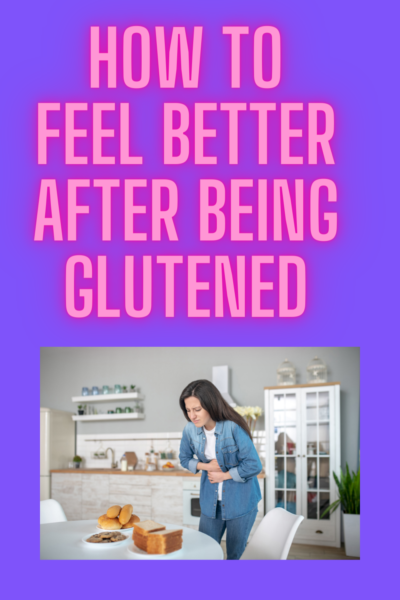Introduction:
Living with a gluten sensitivity or celiac disease can be challenging, especially when accidental gluten exposure occurs. Even with the best intentions and precautions, being “glutened” can happen. Unless you cook all of your food at home yourself in a kitchen with no gluten and pans that have never touched gluten and you never eat out or in anyone else’s home where gluten is present, it will happen occasionally. It is just unavoidable. The aftermath of consuming gluten can be uncomfortable and distressing. I know for me I get major stomach pains, heartburn and sometimes even rashes and fatigue, pain and sleep troubles for at least 3 days and up to a week. However, there are steps you can take to alleviate symptoms and promote a quicker recovery. In this blog post, I’ll explore some ideas on how to feel better after being glutened and provide you with practical tips for a smoother recuperation process.
Identify the Source of the gluten:
- The first step in feeling better after being glutened is to identify the source of contamination. This might involve reviewing your recent meals, checking ingredient labels, and considering where the contamination might have occurred. Understanding what led to the exposure can help you avoid making the same mistake in the future. If you have eaten out recently or at someone else’s home then you can assume this is the likely source. If however, you got glutened at home from your own cooking, it can be much more challenging.
Stay Hydrated:
- Gluten exposure can lead to digestive discomfort, which may result in dehydration. Drinking plenty of water helps flush out toxins and supports your body’s natural healing processes. You can also opt for clear broths, herbal teas, and oral rehydration solutions to maintain electrolyte balance. I find drinking a cup or chicken, turkey or beef bone broth to really help.
Rest and Relaxation:
- After gluten exposure, your body needs time to recover. Prioritize rest and relaxation to allow your immune system to focus on healing. Stress can exacerbate symptoms, so engaging in calming activities such as reading, deep breathing, or meditation can help soothe both your body and mind.
Choose Simple, Nourishing Foods:
- During the recovery period, opt for easily digestible, nutrient-dense foods that won’t further strain your digestive system. Foods like rice, plain cooked vegetables, lean proteins, and fruits can provide essential nutrients without aggravating your symptoms.
Consider Enzymes and Supplements:
- Digestive enzymes and probiotics might help alleviate digestive discomfort caused by gluten exposure. Digestive enzymes can assist in breaking down food more efficiently, while probiotics support gut health. I’ve found these to be helpful on a daily basis even when I haven’t been glutened.
Ginger and Peppermint:
- Ginger and peppermint are known for their soothing properties and potential to alleviate digestive distress. Ginger tea or fresh ginger added to meals can help ease nausea and reduce inflammation. Peppermint tea can also provide relief from bloating and abdominal discomfort. I like to use the essential oils as well by rubbing a few drops on my stomach or putting a few drops in water and drinking them as an essential tool on how to feel better after being glutened.
Monitor Your Symptoms:
- While it’s common to experience immediate discomfort after being glutened, some symptoms might persist for a few days. Keep track of your symptoms and their duration. If they persist or worsen, consider reaching out to a medical professional for guidance.
Restock Safe Foods:
- After a gluten exposure incident, it’s a good time to review and restock your kitchen with safe gluten-free foods. This helps you avoid accidental contamination in the future. Granted this is only helpful if you got glutened at home, if it happened at a restaurant you should seriously reconsider if it’s worth it to eat at that same restaurant again in the future.
Conclusion:
Dealing with the aftermath of accidental gluten exposure can be challenging, but taking proactive steps can help you feel better sooner. Remember to be patient with yourself and your body as it goes through the recovery process. If you’re frequently experiencing gluten exposures, it might be helpful to revisit your strategies for avoiding cross-contamination. I offer a gluten free ebook with videos that can help.

Did this help you? If so, I would greatly appreciate a share on Facebook, twitter, linkedin, or pinterest.
My Favorite Products (Affiliate links- if you make a purchase I may earn a small commission)
Thrive Market - healthy gluten free, sugar free and speciality online food and household products
Silk and Sonder Monthly Journals and Planners
My Portable Infrared Sauna
Self Care Journal
Martie discounted food
Olipop - healthy soda with probiotics and prebiotics
Digestion Kit
Stress Oils








